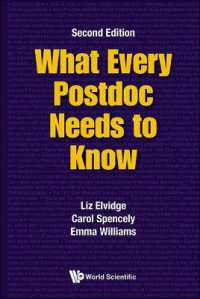- ホーム
- > 洋書
- > 英文書
- > Science / Mathematics
基本説明
New in paperback. Hardcover was published in 2008. When are wars just, and when do they violate international law?
Full Description
In Defending Humanity, internationally acclaimed legal scholars George P. Fletcher and Jens David Ohlin tackle one of the most important and controversial questions of our time: When is war justified? When a nation is attacked, few would deny that it has the right to respond with force. But what about preemptive and preventive wars, or crossing another state's border to stop genocide? Was Israel justified in initiating the Six Day War, and was NATO's intervention in Kosovo legal? What about the U.S. invasion of Iraq?
In their provocative new book, Fletcher and Ohlin offer a groundbreaking theory on the legality of war with clear guidelines for evaluating these interventions. The authors argue that much of the confusion on the subject stems from a persistent misunderstanding of the United Nations Charter. The Charter appears to be very clear on the use of military force: it is only allowed when authorized by the Security Council or in self-defense. Unfortunately, this has led to the problem of justifying force when the Security Council refuses to act or when self-defense is thought not to apply--and to the difficult dilemma of declaring such interventions illegal or ignoring the U.N. Charter altogether.
Fletcher and Ohlin suggest that the answer lies in going back to the domestic criminal law concepts upon which the U.N. Charter was originally based, in particular, the concept of "legitimate defense," which encompasses not only self-defense but defense of others. Lost in the English-language version of the Charter but a vital part of the French and other non-English versions, the concept of legitimate defense will enable political leaders, courts, and scholars to see the solid basis under international law for states to intervene with force--not just to protect themselves against an imminent attack but also to defend other national groups.
Contents
Introduction
1. Murder Among Nations
2. How to Talk Self Defense
3. A Theory of Legitimate Defense
4. The Six Elements of Legitimate Defense
5. Excusing International Aggression
6. Humanitarian Intervention
7. Preemptive and Preventive Wars
8. The Collective Dimension of War
Conclusion







